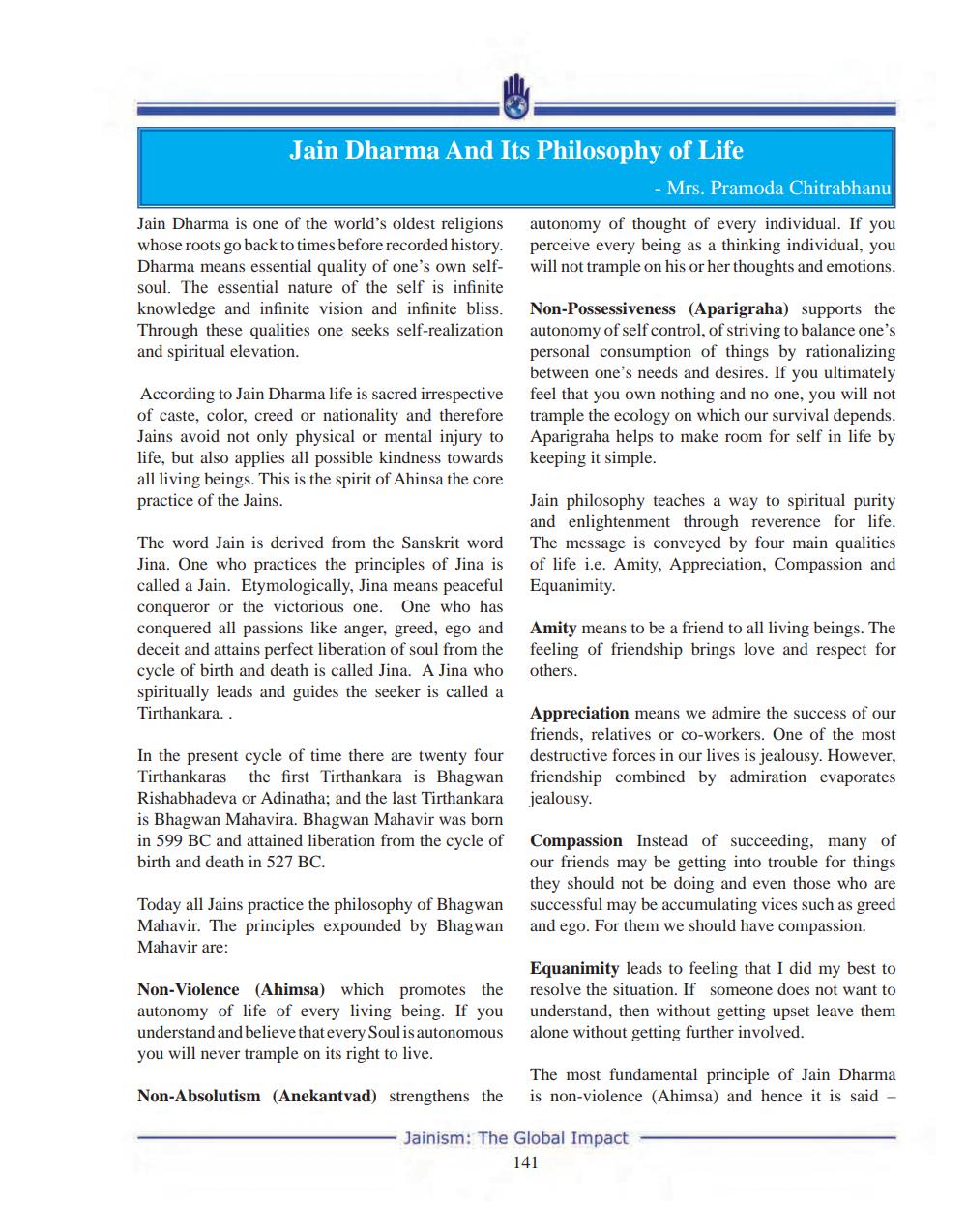________________
Jain Dharma And Its Philosophy of Life
- Mrs. Pramoda Chitrabhanu
autonomy of thought of every individual. If you perceive every being as a thinking individual, you will not trample on his or her thoughts and emotions.
Jain Dharma is one of the world's oldest religions whose roots go back to times before recorded history. Dharma means essential quality of one's own self- soul. The essential nature of the self is infinite knowledge and infinite vision and infinite bliss. Through these qualities one seeks self-realization and spiritual elevation.
Non-Possessiveness (Aparigraha) supports the autonomy of self control, of striving to balance one's personal consumption of things by rationalizing between one's needs and desires. If you ultimately feel that you own nothing and no one, you will not trample the ecology on which our survival depends. Aparigraha helps to make room for self in life by keeping it simple.
According to Jain Dharma life is sacred irrespective of caste, color, creed or nationality and therefore Jains avoid not only physical or mental injury to life, but also applies all possible kindness towards all living beings. This is the spirit of Ahinsa the core practice of the Jains.
Jain philosophy teaches a way to spiritual purity and enlightenment through reverence for life. The message is conveyed by four main qualities of life i.e. Amity, Appreciation, Compassion and Equanimity.
The word Jain is derived from the Sanskrit word Jina. One who practices the principles of Jina is called a Jain. Etymologically, Jina means peaceful conqueror or the victorious one. One who has conquered all passions like anger, greed, ego and deceit and attains perfect liberation of soul from the cycle of birth and death is called Jina. A Jina who spiritually leads and guides the seeker is called a Tirthankara.
Amity means to be a friend to all living beings. The feeling of friendship brings love and respect for others.
Appreciation means we admire the success of our friends, relatives or co-workers. One of the most destructive forces in our lives is jealousy. However, friendship combined by admiration evaporates jealousy.
In the present cycle of time there are twenty four Tirthankaras the first Tirthankara is Bhagwan Rishabhadeva or Adinatha; and the last Tirthankara is Bhagwan Mahavira. Bhagwan Mahavir was born in 599 BC and attained liberation from the cycle of birth and death in 527 BC.
Compassion Instead of succeeding, many of our friends may be getting into trouble for things they should not be doing and even those who are successful may be accumulating vices such as greed and ego. For them we should have compassion.
Today all Jains practice the philosophy of Bhagwan Mahavir. The principles expounded by Bhagwan Mahavir are:
Non-Violence (Ahimsa) which promotes the autonomy of life of every living being. If you understand and believe that every Soulis autonomous you will never trample on its right to live.
Equanimity leads to feeling that I did my best to resolve the situation. If someone does not want to understand, then without getting upset leave them alone without getting further involved.
The most fundamental principle of Jain Dharma is non-violence (Ahimsa) and hence it is said -
Non-Absolutism
(Anekantvad) strengthens the
Jainism: The Global Impact
141




